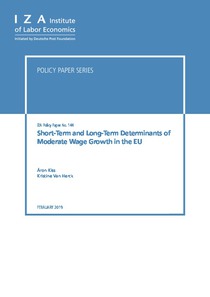Short-term and long-term determinants of moderate wage growth in the EU
"This paper analyses the factors explaining moderate wage growth in the EU in the post-crisis period. It investigates whether the historical relationship between wages and unemployment has weakened and whether composition effects moderated wage growth. The results suggest a negative answer to b...
| Main Authors: | , |
|---|---|
| Institution: | ETUI-European Trade Union Institute |
| Format: | TEXT |
| Language: | English |
| Published: |
Bonn
2019
IZA |
| Subjects: | |
| Online Access: | https://www.labourline.org/KENTIKA-19306091124911242739-Short-term-and-long-term-deter.htm |
| Summary: | "This paper analyses the factors explaining moderate wage growth in the EU in the post-crisis period. It investigates whether the historical relationship between wages and unemployment has weakened and whether composition effects moderated wage growth. The results suggest a negative answer to both questions. Wages in the EU have not stopped reacting to unemployment developments after the 2008 crisis. Wage growth was moderate because of low inflation, low trend productivity growth, and high unemployment. There are only a few Member States with a significant 'shortfall' in wage growth, including both low and high-unemployment countries. Migration, ageing and collective bargaining institutions appear to have mostly transitory effects on wage growth. During the last decade, changes in the composition of the workforce had a small but positive impact on wage growth in most of the EU, especially due to increasing average age and education level. In some Member States such as Germany, Italy, Luxembourg and Portugal, composition effects were a main driver of wage growth." |
|---|---|
| Physical Description: | 37 p. Digital |

